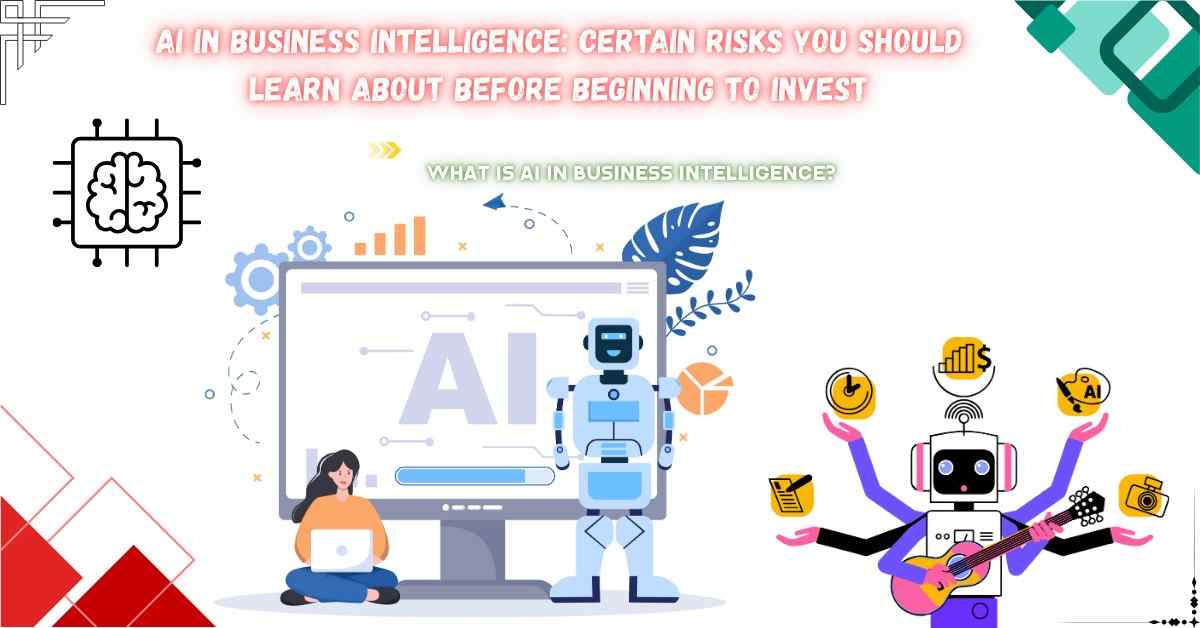In today’s digital world, AI in Business Intelligence is becoming a big trend. They rely on this to guide their actions, understand what clients expect, and raise profits. Even so, business owners need to be aware of the possible risks before investing.
In this article, we’ll explore what AI in Business Intelligence really means, how it works, the benefits it offers, and the possible dangers you should be aware of. The facts can guide your financial choices whether you are running a business or working in a large company.
What is AI in Business Intelligence?
AI in Business Intelligence means using artificial intelligence to analyze data and give useful insights. With AI tools, businesses can scan through large quantities of data in a short time and notice useful trends in the results.
For instance, AI can analyze data on what customers buy, how much traffic the website gets, or their sales records and let the business know what strategies are effective. As a result, leaders know what to do and when to do it.

The advantages of using AI in business intelligence
- AI helps bring many valuable benefits to Business Intelligence.
- Faster Decision-Making: AI is able to process data at a much quicker rate than humans.
- Improved Accuracy: Errors made by machines are much fewer than those made by us.
- Better Forecasting: Predicting what is likely to happen in the future can be done with past data and AI.
- Customer Understanding: AI can examine how customers are behaving and help improve the services companies provide.
- Saving Time and Money: Companies can use AI to cut down on spending due to employees and decrease rates of error.
- It is obvious that AI boosts the smartness and success of businesses using Business Intelligence.
Further reading suggestions: AI Startup Mercor Funding Soars: Massive $3M Breakthrough Fuels Hiring Revolution
Potential Problems Caused by AI in Business
Though AI seems flawless in Business Intelligence, it does come with certain risks companies might not see at first. Let’s review the 3 main things they studied:
1. Data Privacy Issues
For AI systems to work well, they must have access to large datasets. Having customer information in the data can lead to privacy issues. If companies are not careful with how they manage data, they can violate laws like the GDPR.
2. Bias in AI Models
AI learns from past data. Bias found in the historical data is likely to come through in the AI system as well. It may result in making mistakes and harming the reputation of the company.
3. Overdependence on AI
Overreliance on AI can lead enterprises to become careless about making decisions using human experience. Dealing with emotions and ethics, or making creative decisions, can lead to risks when we leave the process to the computer.
4. Lack of Transparency
AI systems often earn the label of being “black boxes.” Sometimes, we do not understand the steps they follow to solve these questions. Should the AI choose incorrectly, it can be very hard to understand the reason behind it.
5. High Costs of Setup
Artificial Intelligence for Business Intelligence costs a lot of money. You need proper tools, expert training, and occasionally experts in the field. It could prove to be expensive for small businesses.
6. Security Threats
Online solutions for AI tasks are always available. If good security measures are not taken, hackers may be able to access and take business data.
7. Legal and Ethical Concerns
Sometimes, AI decisions go against the law or make people question what is morally right. For example, a system that predicts customers are not to be trusted unfairly could damage their reputation.
How to Reduce These Risks
AI in Business Intelligence is not risk-free, but it can still bring many helpful results. The most important thing is to use it in a smart way. Here are some steps you can take to cut down on risks:
- Use clean and fair data: Always look for any flaws or biases in your data.
- Follow privacy laws: Store and handle customer data correctly and within the law.
- Keep humans involved: Don’t fully depend on AI. Human thinking is still important.
- Use secure systems: Ensure that your AI tools are well protected from cyber threats.
- Choose trustworthy tools: Try to use AI technology that comes from well-known companies.
- Train your team: Help your staff understand how to interact with AI properly.

The role of AI in Business Intelligence going forward
AI will have a positive influence on Business Intelligence in the days to come. The expansion of AI technology means it can improve how businesses grow. However, getting optimal results depends on businesses being aware of the benefits and dangers of social media.
Future AI could provide real-time tips, recognize different emotions, or have conversations with customers. At the same time, we should remember that a lot of power means a lot of responsibility.
Further reading suggestions: AI in Education: How to Balance Exciting Opportunities and Serious Challenges
FAQ’s
1. What does the term AI in Business Intelligence involve?
ANS: AI allows using AI technology to process data and make business decisions.
2. What impact does AI have on Business Intelligence?
ANS: Gains are made by finding helpful patterns fast, bringing down the number of errors, and providing data to guide quicker decisions.
3. Is it safe to use AI within Business Intelligence?
ANS: Yes, but this can only happen if they are used correctly. If proper care is not given, there could be issues such as leaked data or decisions affected by biased AI.
4. What tools are commonly used for Business Intelligence in the A.I. range?
ANS: A number of businesses choose Power BI, Tableau online with AI builds, IBM Watson, and Google Cloud AI for their day-to-day business intelligence.
5. Is it possible for small companies to implement AI for Business Intelligence?
ANS: Yes, yet they should look for inexpensive tools and learn the best way to use them. Start with cloud-based AI applications.
6. What challenges are often faced with AI-based Business Intelligence?
ANS: Companies face issues such as insufficient privacy, trouble affording AI, biased data, artificial intelligence being overused, and cybersecurity problems.
7. Is there a chance that AI could replace business analysts and researchers?
ANS: No. AI is valuable in business, but decisions also depend on people’s judgments, morals, and creativity.
Final Thoughts
AI makes a big difference in Business Intelligence. It allows companies to grow, improve time efficiency, and take smarter actions. But it is not perfect. Using statistics can be risky just like using any other type of tool.
It is important to educate yourself on AI in Business Intelligence before committing to its use. With responsible AI use, your company can gain from its advantages but avoid the risks.
When you first use AI for Business Intelligence, take things step by step, learn as you go, and never let your data become unsafe.




Pingback: AI Data Scraping: 5 Shocking Claims in Reddit Lawsuit
Pingback: 7 Powerful Middle East Tech Investments in 2025